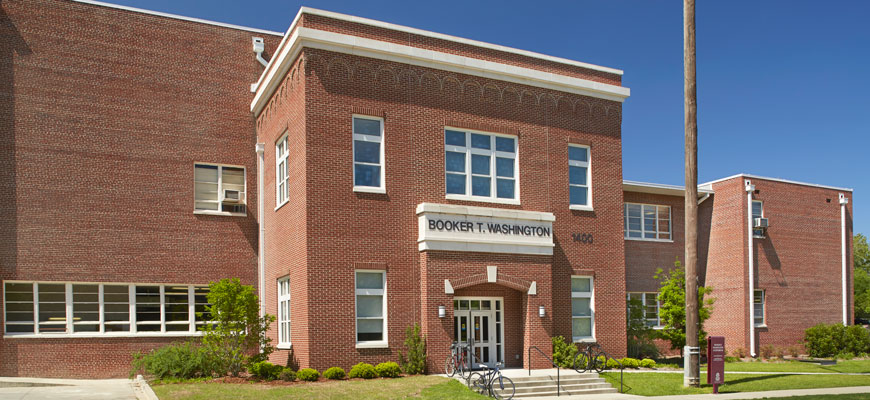
Popular UofSC civil rights exhibit will have a permanent home
Grant will fund restoration and upgrades to Booker T. Washington Auditorium Building
Posted on: April 9, 2020; Updated on: April 9, 2020
By Carol J.G. Ward, ward8@mailbox.sc.edu, 803-777-7549
Booker T. Washington High School, Columbia’s first public high school for African American students, has a powerful history as a significant landmark in South Carolina’s civil rights history. Civil rights leaders J. Andrew Simmons, Septima Clark and Modjeska Simkins taught at the school in the 1920s and 1930s, and NAACP attorneys Matthew Perry and Lincoln Jenkins attended the school as students, along with many other individuals who were active in the community.
The auditorium building, which the University of South Carolina acquired after the school closed in the 1970s, is the only remaining structure of the original 4-acre school complex. Renovations and historical preservation in 2013 not only made important physical upgrades to the building on Wheat Street but also created a space for permanent displays to highlight the school’s six-decade history — 1916 to 1974 — of educating students and future leaders.
Now, the university will continue rehabilitation and preservation of the historic building, built in 1956 and named to the National Register of Historic Places in 2018, to create a permanent space for the Center for Civil Rights History and Research’s exhibit Justice for All: South Carolina and the American Civil Rights Movement. Funded with a $500,000 grant announced by the National Park Service this week, the restoration will advance efforts to create a destination for people to learn the history of Columbia and of the school.
“The National Park Service grant will enable the university to expand earlier efforts to rehabilitate the historic building and address some long-term maintenance issues,” says Bobby Donaldson, professor of history and director of the civil rights center. “But for us, one of the more exciting components is that a portion of the funds will be dedicated to developing a space where the Justice for All exhibit may continue and be available to the general public.”
The popular and successful 2019 exhibit shined a spotlight on turning points in South Carolina's civil rights history that influenced nationwide change. More than 4,000 visitors toured the exhibit, which showcased historic items from more than 60 university library collections. The center, launched in 2015, is a collaboration of University Libraries and the College of Arts and Sciences.
“University Libraries and other faculty have built an impressive archive of historical material that is housed in multiple sites on campus. This will provide a space where students and the general public can now see many of these items firsthand and up close that have been largely stored away in boxes for preservation,” Donaldson says.
The Booker T. Washington restoration is one of 51 projects across 20 states and the District of Columbia that will receive grants totaling $14 million from the African American Civil Rights grant program, which is funded by the Historic Preservation Fund and administered by the National Park Service, Department of Interior.
“The preservation of these projects is an invaluable investment in the campuses, communities and individuals they serve,” says S.C. Congressman James E. Clyburn in announcing the grant. “I am pleased that these funds will continue to allow our communities to learn from the civil rights movement and the important role that South Carolina played in making America’s greatness apply more fairly and equitably to all of its citizens.”
Clyburn, a strong supporter of UofSC’s Center for Civil Rights History and Research, donated his congressional papers to the center in 2015.
In addition to creating a permanent home for the Justice for All exhibit, the grant will fund restoration of the building’s historic facade by repairing water damage to the brick masonry walls and refurbishing the architecturally significant original windows. The building also currently houses the university’s TRIO programs, which serve low-income and first-generation college students, and the College of Arts and Sciences’ lab theater program.
Continuing preservation efforts affirm UofSC’s commitment to documenting and interpreting the history of the movement in South Carolina and the nation and will help strengthen partnerships between the university and the Booker T. Washington High School Foundation and the Ward One and Wheeler Hill neighborhood organizations.
“The University of South Carolina is fully committed to the center and its mission to foster our clear understanding of the past, our appreciation for the present and our shared vision of the future,” says university President Bob Caslen. “We are grateful to the National Park Service for this grant funding. Special thanks to Congressman Jim Clyburn for his support of this important project, which will serve as a reminder that our true strength comes from both our diversity and our unity. Through the center, we hope to empower individuals to come together with knowledge and understanding and move forward with a purpose that will elevate our community and our great state to new heights.”
Donaldson says the work that will be funded by the grant will remind the broader community of the significance of Booker T. Washington High School by expanding the interpretive history and telling a deeper story.
“It's not just a building on our campus,” Donaldson says. “The BTW auditorium has a much longer and deeper history that has a far-reaching meaning for the community. The hope is that space will become a destination where you can learn the history of the civil rights struggle in South Carolina, but also where you can learn the history of the school and the community around it.”